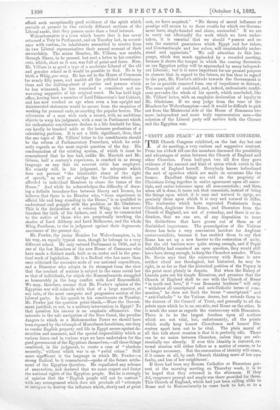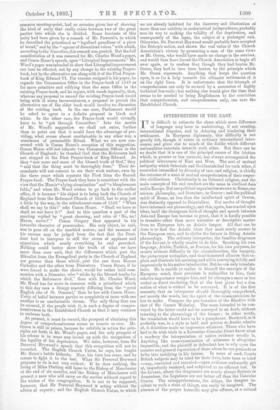" UNITY AND PEACE " AT THE. CHURCH CONGRESS.
THE Church Congress exhibited, on the last day but one of its meeting, a very curious and suggestive contrast. From ten o'clock till one the members discussed the possibility and advantages of union between the Church of England and other Churches. From half-past two till five they gave evidence of the amount and kind of union which exists in the Church of England herself. Everybody knows beforehand the sort of speeches which are made on occasions like the former. Excellent things are said on the propriety of Christians living together in entire agreement upon all essen- tials, and entire tolerance upon all non-essentials ; and then, when all is done, it turns out that essentials, instead of being the things upon which it is easy and natural to agree, are precisely those upon which it is easy and natural to differ. The tendencies which have separated Protestants from Catholics, Anglicans from Rome, and Dissenters from the Church of England, are not of yesterday, and there is no in- dication, that we can see, of any disposition to, treat the distinctions that have grown out of them as of diminished importance. The promulgation of the Vatican decree has been a very convenient incident for Anglican ' controversialists, because it has enabled them to say that Rome has set up a new barrier to the restoration of unity. But the old barriers were quite strong enough, and if Papal infallibility had remained an open question, they would still have been strong enough, to keep the Churches asunder. When Dr. Nevin says that the controversy with Rome is now neither ritual nor theological, but historical, he may be right, in so far as that the .historical position of the Papacy is the point most plainly in dispute. But when the Bishop of Lincoln puts out his simple Eirenicon, and promises that the Church of ,England shall be one with the Church of Rome "in truth and love," if "our Romanist brethren" will only " withdraw all unscriptural and anti-Catholic terms of com- munion," he does not limit the terms " unscriptural " and " anti-Catholic " to the Vatican decree, but extends them to the decrees of the Council of Trent, and generally to all the points upon which he is on one side, and Rome on the other. It is much the same as regards the controversy with Dissenters. There is to be the largest freedom upon all matters which are not vital, but, unfortunately, all the points which really keep honest Churchmen and honest Dis- senters apart turn out to bo vital. The plain moral of all this talk about reunion is that it is perfectly idle. There can be no union between Churches, unless they are sub- stantially one already. If ever this identity is restored, ex- ternal reunion will either follow as a matter of course, or be no longer necessary. But the restoration of ideiatity will come, • if it comes at all, by each Church thinking more of her own faults, and less of her neighbours'. If lere had been any Roman Catholics or Dissenters pre- sent at the morning meeting on Thursday week, it is to be hoped that they returned in the afternoon. If they did, vengeance prompt and ample was there provided for them. This Church of England, which had just been calling alike to Rome and to Nonconformity to come back to her, as to a common meeting-point, had an occasion given her of showing the kind of unity that really exists between two of the great parties into which she is divided. Some foretaste of this unity had been given by a remark of Mr. Fawcett's, in which he described the priesthood as " legalised guardians of a piece of bread," and by the " uproar of dissentient voices "with which, according to the Guardian, this remark was greeted. But the full manifestation of it was reserved for Mr. Charles Wood's paper, and Canon Hoare's speech, upon "Liturgical Improvement." Mr. Wood's paper wasintended to show that Liturgical improvement can best be effected, not by any change in the existing Prayer- book, but by the alternative use along with it of the First Prayer- book of King Edward VI. For reasons assigned in his paper, he regards the Communion Office in the Prayer-book of 1549 as far more primitive and edifying than the same Office in the existing Prayer-book, and he argues, with much ingenuity, that, whereas any proposal to amend the existing Prayer-book would bring with it many inconveniences, a proposal to permit the alternative use of the older book would involve no discussion of the existing book. In the one case, Parliament would be asked to agree to a definite proposal in black and white. In the other case, the Prayer-book would virtually have to be "got through Committee." Into the merits of Mr. Wood's suggestion we shall not enter, further than to point out that it would have the advantage of pro- viding, what seems almost unattainable in any other way, a maximum of permissible Ritual. What we are now con- cerned with is Canon Hoare's reception of this suggestion. Canon Hoare will not tolerate two Communion Offices in the Church of England ; he thanked God that the Reformers had not stopped at the First Prayer-book of King Edward. As they " saw more and more of the blessed truth of God," they " said that the thing must be thoroughly done." Their de- scendants will not consent to see their work undone, even by the three years which separate the First from the Second Prayer-book. The Prayer-book they have is consistent with the view that the Mass is " alying abomination" and "a blasphemous fable," and when Mr. Wood wishes to go back to the earlier office, it is because " his object is to bring back the Church of England from the Reformed Church of 1552, but to stop just a little by the way, in the refreshment-room of 1549." "What shall we say to this?" asks Canon Hoare. " Shall we have or shall we not have it ?" And to this question a part of the meeting replied by "great cheering, and cries of No, no I Never, never " Canon Gregory then appeared in his favourite character of peacemaker. His only object, he said, was to pour oil on the troubled waters ; and the measure of his success may be judged from the fact that the Presi- dent had to interpose to still the storm of applause and opposition which nearly everything he said provoked. Nothing could better show the truth of what we have more than once said, that the differences which part the Ritualist from the Evangelical party in the Church of England are greater than those which part the one from Roman Catholics and the other from Dissenters. Canon Hoare, if he were forced to make the choice, would far rather hold com- munion with a Dissenter, who " sticks by the blessed truths for which the Reformers died," than with Mr. Charles Wood. Mr. Wood has far more in common with a priesthood which to this day uses a liturgy scarcely differing from the " great English rite of St. Osmund," than he has with Canon Hoare. Unity of belief between parties so completely at issue with one another is an unattainable dream. The only thing that can be secured, if the people wish it, is such a degree of compre- hensiveness in the Established Church as that it may continue to embrace both.
At present, it must be owned, the prospect of obtaining this degree of comprehensiveness seems as remote as ever. Mr. Green is still in prison, because he exhibits in action the prin- ciples set forth in Mr. Wood's paper, and the only prospect of his release is • in some way bound up with the recognition of the legality of his deprivation. We infer, however, from Sir Perceval Heywood's speech that this recognition will not be accorded. The English Church Union, he says, has fought Mr. Green's battle hitherto. Now, his turn has come, and he means to fight it to the last. What Sir Perceval Heywood proposes to do is not very evident. If he does nothing, the living of, Miles Platting will lapse to the Bishop of Manchester at the end of six months, and the Bishop of Manchester will present a man who will carry on the service without regard to the wishes of the congregation. It is not to be supposed, however, that Sir Perceval 'Heywood is acting without the advice of experts ; and the English Church Union, to which we are already indebted for the discovery and illustration of more than one subtlety in ecclesiastical jurisprudence, probably sees its way to making the validity of the deprivation, and consequently of the lapse, the subject of a prolonged suit. Otherwise, Sir Perceval Heywood would probably have accepted the Bishop's notice, and shown the real value of the Church Association's victory by presenting a man of the same views as Mr. Green, who would have made no change in the services, and would thus have forced the Church Association to begin all over again, or to confess that though they had beaten Mr. Green, they had in turn been beaten by the principle which Mr. Green represents. Anything that keeps the question open, is so far a help towards the ultimate settlement of it on the right lines. It is unfortunate that the triumph of comprehension can only be secured by a succession of highly technical•law-suits ; but nothing else would give the time that seems to be needed to bring Englishmen to the conviction that comprehension, and comprehension only, can save the Established Church.



































 Previous page
Previous page